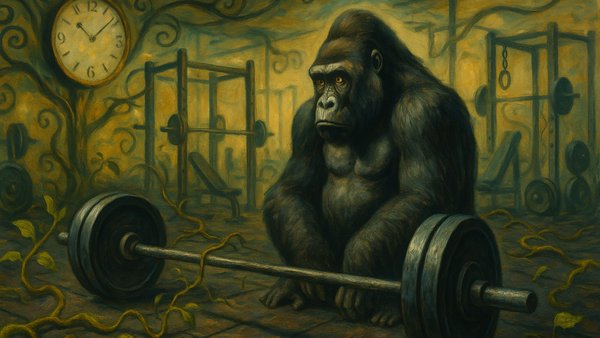The Weapon of the Weak
Uncover the weapon of the weak—requiring neither skill nor accountability—in a desperate war they are doomed to lose. This week’s issue is about strength training, friendship, and video game addiction.

The radical shifts in traditional gender roles, paired with aggressive activism, have driven the war of the sexes to an apex. Birthrates and marriages are plummeting, while single motherhood and abortions skyrocket. State intervention into family affairs—through subsidies, legal restrictions, children’s and women’s rights, and expansive social programs focused on contraception, reproductive health, and female empowerment and administrative participation—has reached unprecedented heights. Yet, paradoxically, social tensions surrounding sexual expression have only intensified rather than dissipated.
Both men and women lament that finding a suitable partner is harder than ever. Women complain about weak men; men complain about insufferable women. So, how did we arrive at this impasse? And more importantly—how do we extract the root of this pervasive discord?
Hypocrisy
The first step toward clarity is recognizing the stunning lack of accountability both sexes display regarding their own behavior.
Both secretly engage in the very toxic behaviors they denounce in their own gender fellows. On top of that, they justify their own indulgences by pointing to the shortcomings of the opposite sex—actions they frame as immoral but conveniently use as a pretext to exempt themselves from what should serve not as universal principles, but merely as veils to obscure their own depravity. Rules shall be in place for all brothers and sisters, and especially for the other sex—for everyone, really, except oneself. Two examples:
Women despise sluts[1] because they lower the market price of sex, making male commitment more costly. Yet, they eagerly behave like sluts themselves whenever the opportunity arises to gain an advantage in the game—while simultaneously blaming other women for the consequences of the very same behavior and accusing the men who engage with them.
Men despise cucks[2] because they lower the market price of male commitment, thereby raising the cost of securing a woman as a mating partner. Yet, they will cuck another man without hesitation if given the chance. Even more so, they adopt the same submissive, desperate behaviors whenever it appears to help them satisfy their immediate desires. They seek to exploit weak men while deriding them for being weak and blame women for engaging with and receiving attention from such men—all while chasing those very same women for easy fleeting pleasure.
Just as women despise sluts yet cannot resist using their own sexuality for futile short-term gain, men despise disloyal women yet cannot resist indulging in their availability. Hypocrisy—the silent catalyst—is primal, inevitable, and driven by pure instinct.
Modern society actively encourages women to be sluts and men to be cucks. Gone are the days when honor, merit, and productive contributions determined social standing. Instead, random ideologies, consumption on credit, and undirected individualistic expression and pleasure-seeking have become the new modus operandi.
Social security and the collectivization of the costs and consequences of moral choices create the illusion that we are exempt from the pressures of survival and natural selection. In reality, we are merely feasting on the remnants of what our ancestors built—dividing, distributing, and redistributing a shrinking stash of resources.
Desirable Individuals
The truly desirable man moves through life unshackled by the moralizing of lesser men or the shaming tactics of women. He is neither repulsed nor enchanted by any woman, including the slut—who is merely an archetype of feminine nature. He does not need her, nor does he waste energy vilifying her. If he desires, he takes; if not, he ignores. His reality remains untouched by her existence, granting him the ability to perceive women in their true nature, just as they are.
In contrast, the weak man—the cuck—resents women because he feels cheated. He cannot secure their love nor their loyalty. He despises them, secretly fantasizes about retribution, and envies the desirable man, perceiving his success as effortless and unjust.
Women, even the most desirable among them, are not free in the same way, for their value remains tethered to extraction—securing the best mate, the best resources, the best relative position within the social group.
A woman’s desirability is simple. It stems from her youth, fertility, homemaking skills, and feminine nature. While some men may have niche fetishes and preferences—such as tattoos, piercings, political activism, rebellious attitudes, or hobbies like video gaming, motorcycling, or partying—most of these qualities hold little practical value for survival and reproduction.
For men, desirability is far more complex. It is not a mere checklist of traits but a fusion of status, dominance, charisma, physical prowess, and resources. A man can be high-status yet undesirable (a weak billionaire or a passive CEO), just as he can be low-status yet highly desirable (a rogue warrior or a starving artist with allure). His desirability does not stem from power or wealth alone but from his ability to create his own reality and move through life as a singularity—this is what makes him feel powerful to a woman. A man’s desirability results from his degree of freedom, derived from his excellence in three domains: physicality, assets, and social skills. The most desirable man excels in all three; a good man is strong in at least two—and if he can only develop one, it should undoubtedly be his social skills.
Compared to a woman, a man’s desirability does not primarily come from social validation but from his ability to command his own world and remain unshaken by and detached from the ever-changing, emotion-inducing forces around him.
Once a man attains dominance, his mating pool expands almost indefinitely. His biological imperative drives him to spread his seed as far and wide as possible—so long as he can afford it financially, socially, or strategically. His desirability gives him options, and his freedom lies in his ability to take them or leave them, dictating the terms of his engagements at his own discretion. The desirable man is not tethered to one mate—he can have many or none at all.
A woman, conversely, does not multiply her mates—she narrows them down, irrespective of her level of desirability. Her reproductive strategy is exclusive, not expansive. Even at peak desirability, she still seeks the best rather than the most. Her biological investment in reproduction—pregnancy, child-rearing, vulnerability—necessitates caution and distillation. Unlike the man, who can spread his genes at minimal cost, the woman must be discerning. One wrong choice, and her evolutionary bet is wasted on mediocre genes or poor security.
While the desirable man moves as he pleases, the woman moves as it benefits her, no matter her level of status. The man says, “I take or ignore as I wish.” The woman says, “I take whatever serves me best.”
So, if all women gravitate willingly to the highest-status man available, and men seek to distribute their resources and genetic material to all sexually available women, and the societal system is built on hierarchical merit and competitive excellence in which men strive to become high-status, who, then, would start a war and disturb this seemingly perfect, complementary union of male and female?
War of the Sexes
The war of the sexes is no modern invention—it is as ancient as life itself. Men seek exclusive access to youth, beauty, and fertility. Women seek exclusive access to strong genetics, resources, and security. Yet neither is willing to give without ensuring they receive more in return.
Men compete among themselves in various disciplines to climb the social hierarchy, hoarding resources, status, and influence to dictate the terms of access. Women leverage their youth, sexuality, and beauty to manipulate those terms, undercutting female competition and securing access to the most desirable man they can attract.
So far, so natural. But who started the war?
Those who attempt to manipulate the natural order in their favor because they resist biological mating dynamics. They are:
- Weak men who refuse to compete and improve.
- Less desirable women (typically older women from their late 20s to late 30s) who failed to leverage their youth to secure a long-term mate.
- Desirable women (typically younger women from menarche to their mid-20s) who overestimate their true social and sexual long-term market value to a desirable man.
The desirable men never had reason to instigate a societal war. Why would they? They take what they want, rule as they please, and both women and aspiring youths gravitate toward them naturally, seeking guidance and leadership.
Nor did the faithful young women. They understand that their long-term provision—genetics, resources, and protection—ultimately comes from men. Aware that their youth and sexual market value have a swiftly approaching expiration date, they act in their best interest by leveraging their prime years to secure the highest-value man in their vicinity they can attract.
But the weak—both men and women—those who fail to attract mating partners in a way that meets their expectations, were the first to resent the natural order. Their tools are moralization, regulation, and restriction. They crafted frameworks, rules, and moral codes to increase their chances of securing mates, resources, and security. Unable to compete naturally, they seek to control, legislate, and shame the strong, constructing systems to rig the game in their favor. Religious doctrines, enforced monogamy, the criminalization of multiple mating partnerships, marriage contracts, contraception, and societal shame—all these serve as weapons to forge social cartels against both the desirable, productive men and the women who naturally submit to them.
While most good men—and even some of the best—fall in open battle against the relentless assaults of the weak, women have mastered an entirely different survival strategy to navigate this dynamic.
Following their innate opportunism, women feign allegiance to weak men and their restrictive sexual morals, regulations, and doctrines. They uphold systems that enable them to extract commitment and resources from those who naïvely believe a woman’s devotion can be purchased with gifts and provision. Yet, the moment opportunity arises, they secretly yield without hesitation to the embrace of the men they truly desire, leaving their unwitting, committed, weak providers to bear the costs and consequences of their deception.
Women never truly ally with weak men—they use them. It is a mirage of loyalty, a feigned allegiance, a temporary contract sustained only by a flow of attention, validation, security, and emotional investment—an investment made primarily by him, believing it will forge a bond, while she offers no true emotional support in return, only a relentless drain on his energy and devotion. A weak man is not truly desired for himself and his character; his only value lies in the accumulated resources she can extract from him. The moment he withholds them, her interest fades, and he is discarded. In contrast, the only thing women wish to extract from the desirable man is his wealth in genetics and the social status conferred by association with him.
Women always pursue the best, even as they secure wealth, stability, and security from the weak, who remain ensnared in their own self-imposed Matrix. Seduced, manipulated, and deceived, they are cast aside the moment their usefulness expires.
The war of the sexes is not simply men against women—it is a seething cauldron of competing forces:
- Weak men against strong men
- Women against weak men
- Less desirable women against desirable women
The first strike was delivered by those who need rules to survive. The desirable man has no need for rules—he is the rule. And the only ones not truly at war are the desirable men and the women who submit to them willingly.
War against God
The so-called war of the sexes is not merely a binary conflict between men and women. It is a hierarchical and multidimensional struggle: lesser women vs. higher women vs. weak men vs. strong men.
Yet beyond the sexual and material level, this war is but a symptom of a far greater battle—one against God and the natural order. At every tier of the hierarchy, the weak do not accept their place—they resent it. Instead of embracing the path of merit and self-improvement, they turn to deception and manipulation, attempting to seize what rightfully belongs to those above them. But the only reward on this path is misery. Two types of people exist:
- The Cunning Resenters—weak in spirit, they do not seek to master but to subvert. Instead of striving to ascend toward divine power, they attempt to bypass, distort, or cheat. They resent the limitations imposed by reality, yet rather than overcoming them through adaptation, they seek to undermine them through trickery. Like the coward who cannot outfight the strong and instead plots from the shadows, these men seek to dethrone God not by strength, but by deception. They despise hierarchy and everyone above or below their own status, yet they crave to be at its top for no reason other than power itself.
- The God-Fearing Challengers—those who do not resent divine power but see it as the ultimate standard. Instead of wishing to tear down God, they seek to understand, test, and approach Him through mastery. Just as a young warrior trains not to overthrow his master but to become worthy of standing in his presence, these men challenge themselves to rise closer to godliness—through wisdom, strength, discipline, and insight. They accept suffering, struggle, and limitation as trials rather than injustices. They do not seek to cheat nature but to harness it—to build machines that defy gravity, alter the course of rivers, and extend their reach beyond the stars. And, most importantly, they do not deceive themselves with weak cravings for fleeting, worldly power.
Blame Game
Among all the weapons of the weak, none is more insidious—both harmful and self-destructive—than blame.
When faced with failure, instead of taking responsibility, one shifts it onto another, who either fights back, redirects the blame, or submits. For what? To shield a fragile ego by evading accountability while rationalizing and justifying laziness. To wield emotional manipulation by burdening others with guilt. To seek social validation and sympathy by cloaking oneself in victimhood. Meanwhile, the problem remains unsolved. Emotions escalate, resentment festers, and the weak remain trapped in failure.
- “You never listen to me!”
“Well, you’re always nagging!” - “I cheated but you drove me to it!”
- “I could have succeeded, but my partner held me back.”
- “I’m unsuccessful because of oppression.”
- “I’m lonely because women/men are shallow.”
- “Women are entitled and use the system to their advantage.”
- “Men are lazy and emotionally unavailable.”
- A woman dates a rich man: “Gold digger!”
She dates a broke man: “Low standards!” - A man dates an attractive woman: “Shallow pig!”
He dates an unattractive woman: “Desperate!” - The man pays the bill: “Patriarchy! Women don’t owe you sex.”
The woman pays the bill: “So cheap, men aren’t providers anymore. He for sure doesn’t get into my panties tonight!” - “Women objectify themselves.”
“What’s your Instagram and OnlyFans handle, gorgeous?” - “Men never express their emotions.”
“He’s such a crybaby.”
Blame is one of humanity’s oldest and most insidious pastimes—dodging responsibility while pointing the accusatory finger at another. It is the coward’s war, the sly manipulator’s shield, and the perpetual loser’s favorite strategy.
Though both sexes engage in the blame game, women seem to wield it with a particular unreflective automaticity, deeply ingrained as a biological and social survival mechanism. To unveil the juiciest truth of the sexual battlefield, let’s take a look at the pinnacle of modern sexual hostility and warfare: Feminism.
Feminism is not “all women,” nor even “women in general.” It is a radical activist movement composed of—you guessed it—individuals of both sexes who fall into the category of the Cunning Resenters: less desirable men and women waging war against natural hierarchies and the mating opportunities that emerge from them. Confronted with the existential threat of natural selection, they feel betrayed—thus, they must resent.
One of the particularly fascinating symptoms to observe in this movement is that women within it rarely mate with the men who support it. They may feign camaraderie, cultivate more or less one-sided friendships, or even entertain relationships with these men, but primarily to extract resources—rarely with any true mating intent. Given the opportunity, female Feminists do not select the weak men championing their cause. Rather, they submit to the very men they claim to oppose—desirable men with the traditional masculine traits of physical strength, self-confidence, independence, risk-taking, perseverance, resilience, innovation, dominance, and stoicism.
The battle these women wage is a theater piece, serving simultaneously as both a performance for the attention of the strong and a pretext to further justify the extraction of resources from the weak who support their apparent noble cause.
This dynamic, by the way, also explains the lower relative birth rates within feminist social circles as well as fem-centric societies.[3] The core objective of Feminism is to dismantle traditional gender roles and the biologically Pareto-efficient[4] division of labor between men and women. As outlined above, intersexual attraction is heavily linked to these roles. If women are drawn to strong, competent, and dominant men, while men are drawn to feminine, nurturing, and youthful women, and individuals of the feminist ideology typically resent or simply lack traditional masculine and feminine qualities, attraction is disrupted, and procreation naturally declines.
Thus, Feminism is not a war of women against desirable men. It cannot be, for no woman attacks a man she truly desires—she submits. If a woman appears to attack such a man, it is not an act of hostility but a test to verify his desirability. In reality, Feminism is merely an extreme manifestation of the war dynamics outlined above:
- Weak men fight against strong men, hoping to sexually appeal to the women they claim to defend.
- Women fight against weak men, restricting their access to intimacy and mating opportunities while exploiting their resources.
- Less desirable women fight against desirable women, seeking to obstruct or undermine their access to the top-tier men, while simultaneously inflating their own desirability to improve their chances of gaining or regaining access to these men.
This truth becomes even clearer when one examines the typical so-called “arguments” of Feminism. These are not true arguments but mere accusations disguised as just principles, serving one purpose alone: shifting power dynamics by securing privileges under the guise of fairness, while burdening men with society’s responsibilities and lowering their own societal net contribution.
- “Men are violent and aggressive. They cause wars and destruction and must therefore ‘unlearn’ traditional masculinity. Men should be compliant, providing, and docile to women’s wishes and whims—yet also strong and protective within the confines of what ideally suits women.”
- “Men must listen to women, understand them, and accommodate their needs while the needs of men are largely irrelevant. Women’s struggles matter because of their ‘systematic oppression’ due to ‘male power’, whereas men’s struggles (suicide, war, workplace deaths, loneliness, burdensome labor, etc.) are not ‘real’ oppression but mere inconveniences they should endure, deal with themselves, and just get over because they benefit from the ‘patriarchy.’ Men should want what women want; anything else is ‘selfish,’ ‘toxic,’ or ‘rebellious.’”
- “Men are predatory and ‘objectify’ women. Their desire is aggressive and entitled. If an unattractive man expresses his desire, he is a ‘creep.’ A woman’s desire, however, is always natural and just.”
- “Men ‘suppress’ their feelings, making them incapable of handling emotions or maintaining lasting relationships. They must therefore ‘open up’ and display their feelings. A man who refuses is ‘insecure’ and ‘weak.’ A man who does display emotion is also ‘weak’ and needs to ‘man up.’ Yet simultaneously, men must be ‘strong’ to ‘handle’ all of women’s emotions, which are invariably ‘empowering’ and ‘brave.’”
- “Men avoid commitment because they are ‘selfish’ and ‘immature.’ If they expect loyalty and submission in return, they are ‘controlling’ and ‘misogynistic.’ Men simply fear ‘strong’ and ‘successful’ women.”
- “Women deserve respect. Men must prove their worth to receive respect. A man who expects the same automatic respect is ‘weak,’ ‘entitled,’ or ‘insecure.’”
- “Men should court, accept, appreciate, and support all women, regardless of their weight, age, condition, or behavior. Women are entitled to have preferences (height, wealth, status, looks, race) and may reject men at will. A man rejecting a woman for his own preferences (youthful, healthy, fit, family-oriented) is ‘shallow,’ ‘sexist,’ and ‘misogynistic.’”
- “Toxic masculinity is the reason men prefer younger, more fertile, and more feminine women. Women don’t even reach their peak desirability, potential, and sexual activity until their 30s or 40s—after they have gathered ‘experience.’ Men must evolve past their ‘primitive’ instincts and align their preferences with ‘mature’ women.”
- “Young women have nothing to offer but their ‘looks.’ They should not date older men because it is ‘creepy.’ A man who prefers younger women is a ‘predator’ or ‘pedophile.’ If he values virginity or a low body count, he is ‘insecure’ and ‘sexist.’ Men should only date women their own age.”
- “Traditional women who marry early are ‘weak’ and ‘inexperienced’ and are merely trying to please men. A real woman is ‘independent’ and ‘doesn’t need a man.’ Traditional (sexually exclusive) marriage and gender roles with their rights and obligations are outdated. Being a housewife is ‘humiliating’ and ‘oppressive.’”
- “Beauty standards are ‘unrealistic,’ ‘oppressive,’ and ‘harmful’—as is every female dress code. Youthful beauty is a social construct.”
- “Women must have the right to have sex whenever they want and under their conditions, even in marriage. It is their decision alone whether to use contraceptives. If they become pregnant, they have the absolute right to abort the fetus at any time. If they choose to conceive, they also have the absolute right to do so. All these rights persist regardless of whether they were exercised through nonconsensual means. In both scenarios, men and society are obligated to provide financial and social support for their choices.”
Every single one of these “arguments” is nothing more than a projection of personal shortcomings, wrapped in blame. At their core lies the fear of inferiority and abandonment. Any attempt to appease these superficial demands—concessions that men and society are expected to make for less desirable women and weak men, without requiring the real, hard work of self-improvement—only feeds this sense of inadequacy, birthing ever more extreme, radical, and insatiable demands.
Yet, amid all this blame primarily directed at men, one pressing question remains: Who raised these men?
If men fail to meet the standards women set—if they fall short of what women desire—then because women themselves failed to raise them to be better. The hands that shape men—their mothers, sisters, teachers, lovers—are all women. Likewise, many men harbor resentment and hate toward women, despising their nature, yet fail to recognize how men themselves have conditioned, enabled, and shaped that very nature.
Feminism, along with any ideology that pits the sexes against each other—whether it be women rebelling against men or men rebelling against women (MGTOW, male transsexuality, etc.), resenting their own natural sexual identity—is not just harmful to society but also self-destructive to those who embrace it. A war against the opposite sex is ultimately a war against oneself.
Both men and women must learn to accept and embrace their natural sexual identity and strive for excellence. Each sex is responsible for the other’s condition. Blaming one another is futile—any shortcoming in one is a direct reflection of the influence and conditioning of the other. We are all the product of our own accumulated choices and actions. Blame is the game of fools; only introspection and self-improvement lead to prosperity.
The war of the sexes is not about equality or justice—it is a rebellion against our own failings, a battle against the self.
The more we all play the blame game, the more women lose their grace, and the more men lose their strength and assertiveness. A man must be forged into strength, not coddled into weakness. A woman must be nurtured into grace, not embittered into resentment and hostility.
Humility and self-mastery—not blame—are the paths toward the light. It takes courage to look within and refine oneself rather than scream outward and demand change from others. And courage—ah, courage—is what separates the great from the mediocre.
Where do you stand in this war? Above and beyond, focused on your own sphere of influence, accepting the burden of responsibility and self-transformation? Or still among the weak, tangled in their futile struggle, dragging and being dragged into their losing game?
⏤Ferdinand
A woman who engages in frequent, indiscriminate, or opportunistic sexual encounters, prioritizing short-term pleasure over long-term strategy. The defining trait is the lack of discernment, not necessarily the number of partners—the slut trades sex for attention, validation, power, or resources without loyalty to a mutually beneficial long-term purpose. Her promiscuity lowers the market value of female intimacy, destabilizes commitment structures, and triggers both desire and disdain from men, depending on the context. ↩︎
A man who tolerates, accepts, or is complicit in his own humiliation, particularly in sexual and relational dynamics. Traditionally, a cuck is a man whose woman cheats on him (or engages in sexual relationships with other men) while he either remains oblivious, powerless, or even willingly encourages it. More broadly, a cuck is any man who cedes authority, allows himself to be exploited, or prioritizes servitude over self-respect—whether in personal relationships, social hierarchies, or ideological battles.
In this context, “to cuck another man” means to engage in or pursue a sexual or romantic relationship with a woman who is already in a committed relationship, thereby making the other man a “cuck” by either deceiving him, humiliating him, or rendering his commitment meaningless. ↩︎Women’s empowerment and fertility: A review of the literature.
Roe v Wade and American fertility.
Relationship between gender role attitude and fertility rate in women referring to health centers in Mashhad in 2013.
A review of research of the relationship between gender equity and fertility in low-fertility settings.
More Gender Equality, Lower Fertility?
The Failure of Feminist Natalism.
↩︎Pareto Efficiency (or Pareto Optimality) is an economic and decision-theoretical concept that describes an allocation of resources where it is impossible to make any individual better off without making at least one other individual worse off. In a Pareto-efficient state, all potential gains from trade or reallocation have been exhausted, meaning that no further improvements can be made without causing harm to someone else. ↩︎
✨ Sunday’s Sparks
🏋🏼 Exercise: Jeff Nippard
I recently stumbled over content from Jeff Nippard. He is a bodybuilder with an extensive amount of comprehensive and meticulously crafted gym advice. No matter if you want to get started or are already advanced—and haven’t yet heard of him—go check out his page. He offers a ton of free content on his YouTube channel as well as paid programs for all levels.
📚 Book: Of Mice and Men, John Steinbeck
Powerful novella about friendship, dreams, and hardship during the Great Depression in the US, following two displaced ranch workers, George and Lennie, as they pursue the hope of owning land. Steinbeck portrays their bond with deep empathy, contrasting Lennie’s innocence and strength with George’s protective pragmatism. Through vivid prose and tragic inevitability, Of Mice and Men examines loneliness, fate, and the fragile nature of human aspirations.
📝 Article: How to Quit Playing Video Games FOREVER
Great advice from Cam Adair on how to tackle a video game addiction. Adair himself used to play video games competitively until he changed his life completely. He now runs a course on quitting video games—Game Quitters—and also did a TED Talk on the subject (see below).
The social aspect of these games is what really draws you in. That’s why playing a non-multiplayer game is fun, but only for a limited time. Eventually you get bored and do something else. But the games that keep you around for a long time are the ones that are social.
Think about World of Warcraft, or Modern Warfare 2. These games added a major social aspect to each game, and that is why they have millions of players worldwide, millions of players who play them for a long long time.
You no longer have a reason to go out and meet people if you can just log into a video game that is a ton of fun, let’s you escape from reality, let’s you see constant measurable growth, and continues to challenge you every time you play. When you are still interacting with people, staying home on a Friday night doesn’t look so bad now does it?
If you look at the best and most addicting games out there, they all comprise these core pieces. They are challenging, but you can also see constant growth and improvement over time. They allow you to escape, even if only temporarily. They are social.
💡 Sunday’s Wisdom
We moderns have an arsenal of tranquillisers and painkillers at our disposal, but our expectations of ease and pleasure, and our intolerance of inconvenience and discomfort, have increased to such an extent that we may well suffer from pain more than our ancestors ever did.
From Sapiens
by YUVAL NOAH HARARI
Captured with the powerful Kindle reader.
Did this issue spark something in you? Fuel Sunday Sparks’ independence.
Flows straight into content, not coffee.




